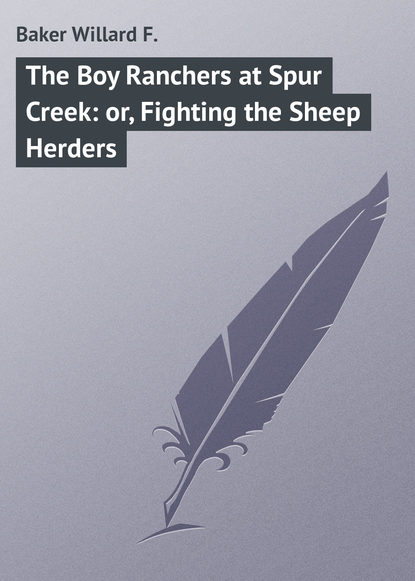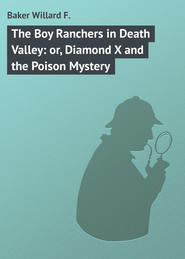По всем вопросам обращайтесь на: info@litportal.ru
(©) 2003-2024.
✖
The Boy Ranchers at Spur Creek: or, Fighting the Sheep Herders
Настройки чтения
Размер шрифта
Высота строк
Поля
"But they have no right to take Mr. Merkel's land!" said the ranchman's lawyer. "We grant that they have a right to pasture sheep, or even elephants, for that matter, on land they can rightfully claim. But they can't claim land already taken up and given over to the pasture of cattle. We recognize, Your Honor, that to the Court there is no difference between a sheep and a cow."
"You are right there," admitted the Judge, "and I suppose you are prepared, Mr. Bonnett, to substantiate your client's legal claim to this land by deeds and other papers."
"Unfortunately my client's deeds are missing," Mr. Bonnett had to admit, at which admission there was a grin from Del Pinzo, so Bud thought, at least. "But if we have time we can bring the necessary papers into court. Therefore we ask for delay."
"And we oppose delay, for the reason that our sheep are suffering from lack of fodder and we have a right to pasture them on the Spur Creek lands!" cried the opposing lawyer.
"I'll grant a week's postponement," decided the Judge. "If in that time, Mr. Bonnett, you can not file proof, I'm afraid – "
He did not finish, but they all knew what he meant. He would be obliged, in strict law, though perhaps not justice, to let the sheep men come in on land that Mr. Merkel claimed under rights of former laws, when he had taken them up after a government opening.
As has been said, legal matters in this sparsely settled part of the United States were not as strictly enforced as in large cities. There the loss of deeds could be made up by other evidence. But in the west the papers were needed and without them, even though in possession, there would be trouble to prove a claim.
"But if the sheep come, even though the court says they may, there'll be another fight!" declared the ranchman, in spite of his lawyer's efforts to keep him quiet.
It was two days after that when Nort started out of the ranch house one early evening. There had been a consultation before he left, and when he was ready to go he almost collided with Yellin' Kid, who entered.
"What's the matter with you, Greaser?" cried the Kid angrily. "What you doin' in here, anyhow?"
"Well, Kid, if you don't recognize me I guess I'm safe!" chuckled Nort.
"Nort!" shouted the Yellin' Kid. "What the – "
"Not so loud!" cautioned Nort, laughing. "How do you like my disguise?" he asked. And then, changing his voice to a whine, he begged in slangy Spanish for a cigaret (which, of course, he did not smoke) though he muttered his "thanks, Señor," in a manner that caused Yellin' Kid to exclaim:
"They'll never find you out! Good luck to you!"
"Adios," laughed Nort.
CHAPTER XXIV
THE BRONTOTHERIUM
There were busy times in the camp of Professor Wright, who was searching for the fossil bones of a once living Brontotherium. The scientist felt sure he was on the right track, though one of his college assistants was openly skeptical.
"This isn't the right rock formation at all, to dig for a Brontotherium," he declared.
"So some of my helpers held the time I discovered the other gigantic fossil bones," retorted the professor. "But I proved that I was right. We shall yet find a Brontotherium – or what is left of one – you'll see!"
Bud and Dick found time to stroll, occasionally, over to the camp of the scientist, for there was much to interest them there, and they wanted to be on hand when the "great discovery," as Professor Wright referred to it, should be made.
"Do you know," remarked Bud, as he and his chum were riding over to the scene of excavating operations one day, "there's something quite satisfying in going over among so much scientific knowledge."
"Particularly when we don't have to absorb any of it ourselves, under compulsion," remarked Dick with a chuckle. "It's like visiting a school and watching the other fellows boning away."
"Yes," agreed Bud. "We don't have to open a book nor learn a lot of names as long as your arm. I wonder why they gave such long names to these prehistoric monsters, anyhow?"
"Give it up," spoke Dick shortly. "There must be a reason."
"I reckon there is, but why in the name of Tunket couldn't they call 'em something shorter? Wouldn't it sound funny if we had to call a horse a Brontosaurus?"
"I'd teach mine to come without calling if it had a name like that!" chuckled Dick. "But say, Bud, while we're over there – in the camp I mean," and he pointed to it among the distant hills, "don't mention Nort's name."
"No, dad said not to, but I don't understand it at all."
"Neither do I, but the least said the better. And if anyone over there – especially Del Pinzo – asks for Nort, we're not to even admit he isn't with us. Sort of say he'll be along presently."
"I savey!"
The boys reached the scene of the digging operations which were quite extensive, Professor Wright being liberally supplied with money from some learned society that was interested in securing for the college the largest possible collection of fossil bones of long extinct monsters.
The boys knew some of the workers, and more than a few of the young college men – some of the professors – who had been brought to the place by Mr. Wright. And it was while Bud and Dick were again talking over how foolish it seemed (to them) to use such long names in speaking of the long-dead monsters that Professor Wright heard them.
He did not happen to be busy at that particular moment, and he was a man who never neglected an opportunity of imparting knowledge. He would do this not always with discrimination, for Bud used to tell with a laugh how once he overheard Professor Wright talking most learnedly to an ignorant Greaser who had merely stopped to inspect a pile of bones.
"He was getting off the longest string of jaw-breaking Greek and Latin terms," said Bud, telling the story, "spouting away how many millions of years ago the Dinosaurs trod the earth, what they lived on, how they fought among themselves, and he was dwelling particularly on how a change of conditions wiped all these birds off the earth."
"Meaning, by birds, the Dinosaurs and the like?" asked Dick.
"Sure."
"And how did the Greaser respond to it all?" Dick wanted to know.
"Oh, he took it all in with open mouth," chuckled Bud. "Every now and then he'd out with a 'si señor,' which encouraged Professor Wright to go on."
"And how did it end?" asked Dick.
"Oh, the prof. kept spouting away for an hour or more, showing bone after bone of some he'd dug up (this was before the present occasion) and when he was all through he leaned back with a jolly satisfied smile on his phiz.
"But say, Dick," went on Bud, "I wish yon could have seen the look on the dear old prof.'s face when the Greaser pointed to the bones and grunted out:
"'Him good plenty much make soup!'"
"No! Really?"
"As sure as I can throw a rope! The idea of boiling up the million-year bones to make soup! I sure thought the prof. would die! After that he didn't spout his wise stuff to any more Greasers."
"I shouldn't think he would."
But on this occasion Professor Wright had a ranch more receptive and intelligent audience. For, as I have said, overhearing Dick and Bud discussing the "jaw-breaking names," as the boys termed them, the scientist approached them with a reassuring smile on his face and said:
"You are somewhat like the old lady, told of in the book written by Professor Lucas of the American Museum of Natural History. In his introduction he speaks of the necessity for using what are termed 'big' words – that is scientific terms, and he mentions an old lady who said she wasn't so surprised at the discovery of all these strange animals, as she was at the fact that someone knew their names when they were found."
"But you don't know the names when you find them; do you?" asked Dick. "Don't you name them after they are found?"
"In a way we do, yes," answered the scientist. "But in the case of those already found – and I am searching for specimens of some extinct animals already identified – we have settled upon names.
"As Professor Lucas remarks, the real trouble is that there are no common names for these animals. As a matter of fact, when they existed there were no people on earth to name them, or, if there were, the names given by prehistoric man were not preserved, since they wrote no histories.










